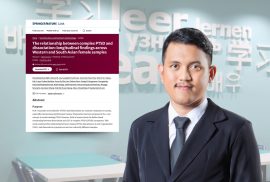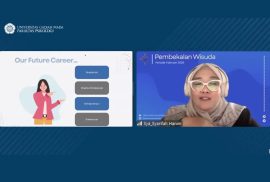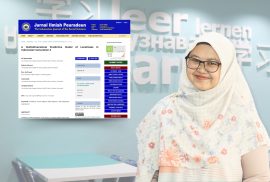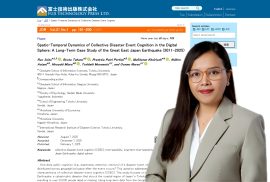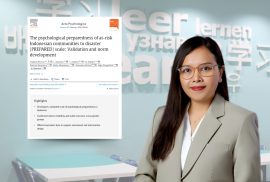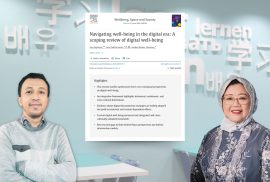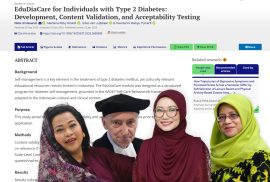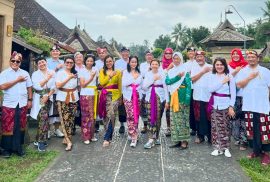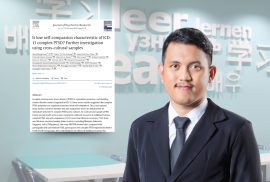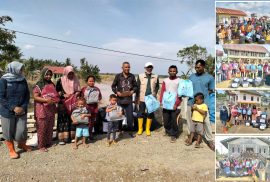Yogyakarta, February 26, 2026 – Psychological disorders such as post-traumatic stress disorder (PTSD) and dissociative symptoms (feeling “detached” from oneself) are common responses when individuals experience profound trauma. A recent international collaborative study has uncovered the dynamics of the relationship between complex post-traumatic stress disorder (CPTSD) and dissociative symptoms through a cross-cultural approach involving participants from Western and South Asian countries.
Release
The Faculty of Psychology at Universitas Gadjah Mada (UGM), through its Career Center, organized a Graduation Briefing for prospective undergraduate graduates of Period II Academic Year 2025/2026 on Monday (February 23), held online via Zoom Meeting. The event was attended by 59 undergraduate candidates, consisting of 52 regular program graduates and seven graduates from the International Undergraduate Program (IUP).
Yogyakarta, February 24, 2026 – Amid the rapid advancement of digital technology that enables people to stay constantly connected, loneliness has emerged as a new challenge for young generations. This phenomenon is highlighted in a recent study titled “A Multidimensional Predictive Model of Loneliness in Indonesian Generation Z,” published in the Jurnal Ilmiah Peuradeun.
Yogyakarta, 10 February 2026 – How do public memory and attention toward disasters change over time? This question is at the center of a recent study involving researchers from the Faculty of Psychology, Universitas Gadjah Mada (UGM), in an international research project on the dynamics of collective disaster cognition in the digital era.
The study was published in the Journal of Disaster Research in an article titled “Spatio-Temporal Dynamics of Collective Disaster Event Cognition in the Digital Sphere: A Long-Term Case Study of the Great East Japan Earthquake (2011–2025).” The research is a collaboration between scholars from Japan and Indonesia, with academics from UGM’s Faculty of Psychology participating as members of the author team.
The PREPARED Scale: Measuring the Psychological Preparedness of Indonesian Communities for Disasters
Yogyakarta, 3 February 2026 – A study entitled “The psychological preparedness of at-risk Indonesian communities to disaster (PREPARED) scale: Validation and norm development,” authored by Pradytia Putri Pertiwi et al. and published in Acta Psychologica (Vol. 262), provides an important contribution to the measurement of psychological preparedness for disasters among Indonesian communities. To date, disaster preparedness initiatives in Indonesia have largely emphasized physical and material aspects, while the psychological dimension has received relatively little attention, despite evidence showing that psychological preparedness is associated with better stress management and a reduced risk of post-disaster mental health problems.
Yogyakarta, 3 February 2026 – The rapid development of digital technology has transformed the way people work, interact, and live their daily lives. Behind the many conveniences it offers, an important question arises: how can well-being be maintained in an increasingly digital world? This question is explored by researchers from the Faculty of Psychology, Universitas Gadjah Mada (UGM), through a comprehensive study on digital well-being. The findings were published in the international journal Wellbeing, Space and Society (Elsevier) in an article entitled “Navigating Well-being in the Digital Era: A Scoping Review of Digital Well-being.” The study was authored by Sovi Septania, Avin Fadilla Helmi, and Haidar Buldan Thontowi.
Yogyakarta, 3 February 2026 – Type 2 diabetes mellitus remains a major public health challenge in Indonesia. Beyond medical treatment, the success of diabetes management is strongly influenced by patients’ ability to perform daily self-care. Responding to this need, a research team from the Faculty of Psychology, Universitas Gadjah Mada (UGM), has developed EduDiaCare, a diabetes education module specifically designed to align with the cultural context and living conditions of patients in Indonesia.
Bangli, Bali — In commemoration of the 61st Anniversary of the Faculty of Psychology, Universitas Gadjah Mada (UGM), the UGM Faculty of Psychology Alumni Association (Kapsigama) organized a series of Alumni Day 2026 activities at Pasraman Gurukula, Bangli, Bali, on 31 January–1 February 2026. The event combined an alumni gathering with community service in the form of mental health promotion for students at Pasraman Gurukula.
Yogyakarta, 30 January 2026 – A recent study entitled “Is low self-compassion characteristic of ICD-11 complex PTSD? Further investigation using cross-cultural samples,” authored by Hong Wang Fung, …, Riangga Novrianto, et al., and published in the Journal of Psychiatric Research (Vol. 193), examines the association between self-compassion and symptoms of complex posttraumatic stress disorder (complex PTSD) as classified in ICD-11. Complex PTSD is a trauma-related disorder that has been relatively recently recognized in ICD-11 and is reported to have a higher prevalence than standard PTSD.
The Faculty of Psychology, Universitas Gadjah Mada, through the Center for Public Mental Health (CPMH), continues its humanitarian support for communities affected by flash floods in Aceh. Following the delivery process and coordination with local partners, assistance in the form of dignity kits and other essential items has been received and directly distributed to residents in several affected areas in North Aceh.

